I spent July 19-21 at Console-ing Passions in Boston, MA, which describes itself as an “international conference on television, audio, video, new media and feminism.” I have to confess I’m still not sure how I feel about feminism. In fact, I’m still not sure what feminism is. I am, however, sure that whoever feminists are, and whatever it is they stand for, the ones who attend CP do seem to be my people. Certainly, my pet peeves with certain things that appear under the sign of feminism—a lack of intersectional understanding and a surplus of gender essentialism—were not in evidence.
But what made the conference great was more than the fact that the content of the talks was interesting and the theoretical framework wasn’t frustrating. I was trying to tell a colleague about how awesome it is, and she asked “Who did you meet?” expecting me to name famous feminist media studiers. And I really couldn’t, because that wasn’t it.
Granted, having Mia Consalvo (@miaC) ask me a question in my panel and then reference my response (by name) in her panel the following day was a great moment of a senior scholar paying attention to me, which made my day. But my day was made many times, by lots of people, most of whom weren’t (yet) internationally recognized heavy-hitters.
Console-ing Passions, that is, was a space overflowing with productive intellectual exchange in a way that I have not seen at most other conferences. In fact, this feeling was pretty similar to what got me rhapsodizing about AoIR back in October.
By contrast to the anonymity of a huge national or international conference and the needle in the haystack feeling of finding those 50 people you do want to talk to out of the 5000 attendees, CP was full of smart people working on things I found interesting and who were collegial if not downright friendly.
I happened to experience the quality of CP as a conference most directly through the Twitter backchannel—which was, as might be expected, rich and really interactive on a different scale than I’m used to—so that forms the basis of the rest of the post. Rest assured that collegiality and intellectual exchange took place in other forms, too.
Just as an overview, Anthony C. Bleach (@acbleach) made this outstanding interactive map using Martin Hawksey’s (@mhawksey) rad TAGSExplorer tool that I think is a useful visualization of the conference community that formed.
There were lots of people interacting with each other, including things like backchannel cross-talk across panels. I had a great exchange with Amanda Ann Klein (@princesscowboy), who chaired my panel but who at this point in the conference I had not yet met, started by her comment about a panel she was in: 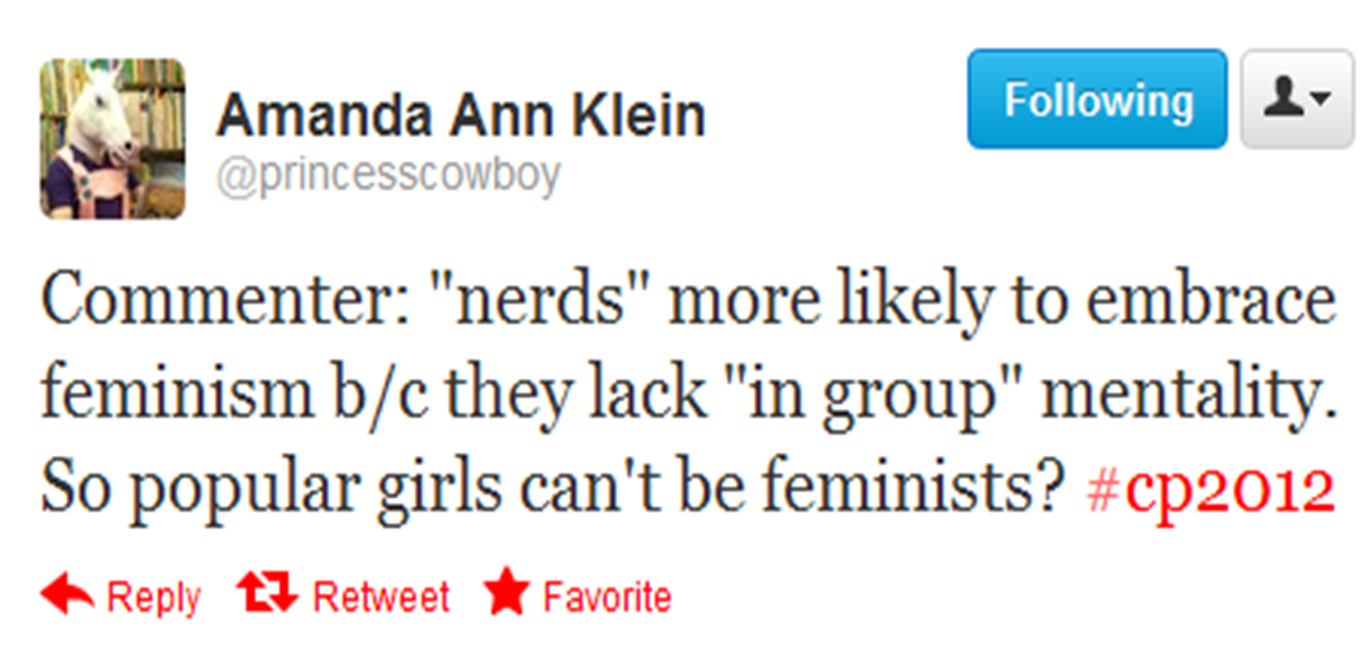
My exact reply is lost now because I deleted it in order to phrase it more clearly and then didn’t get around to posting the revised version before Klein’s response came in, but it said something like “well, popular girls benefit from normative femininity, so I can see it”—and then we had this exchange: 
That is a pretty interesting and nuanced conversation with someone who’s essentially a complete stranger, which generally one assumes can’t happen on the Internet, but the CP environment made it possible.
And that’s just the tip of the iceberg on the sorts of intellectual exchange that went on. As a counterpoint to my academic telephone complaint, I got to see my ideas travel outward within the space of the conference itself (correctly!) as things I said in my talk were tweeted and retweeted or ideas from previous conversations were generally recirculated: 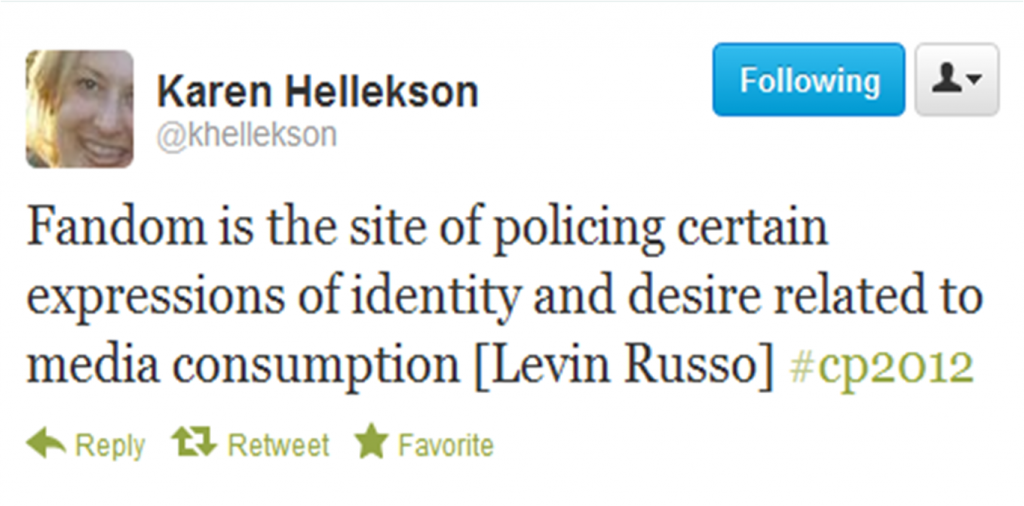
Though there was one detour into message garbling: 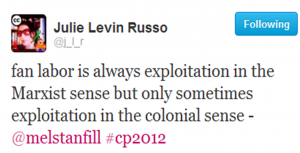
This post isn’t meant to be self-congratulatory that my ideas have been well-received (though I won’t pretend that’s not exciting), but to demonstrate the quality of engagement that CP produced by means of my personal encounter with it. And overall, this experience has suggested to me that I perhaps need to reevaluate my process for selecting conferences.
Because it turns out that small, specific ones (though not so small or specific you don’t learn anything or meet anyone new) make for much better experiences overall.

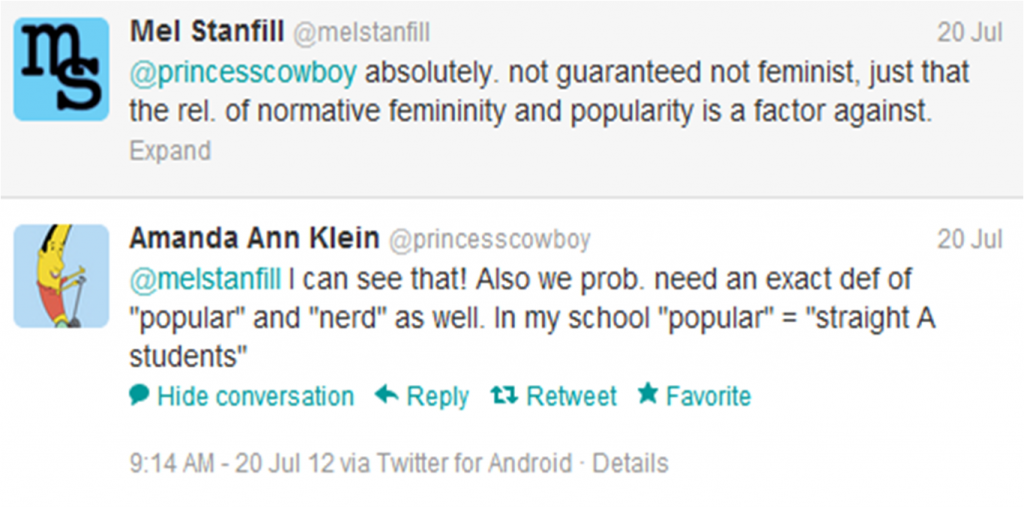


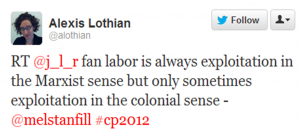
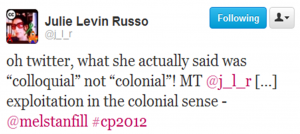
One Comment
Thanks for bringing together a lot of the thoughts I had about CP as well. It’s exciting when a conference actually functions the way it should, versus the unwieldiness too often a characteristic of something like NCA. This year’s CP has also convinced me of the centrality of Twitter, and I’m on board now :-).